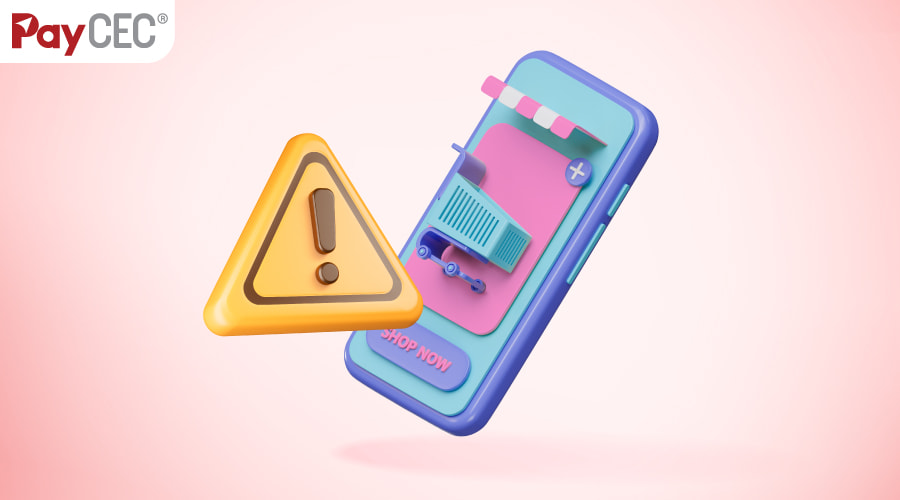- Hotline +65 6631 8332
Do we need PCI DSS compliance if we use Payment Gateway for online stores?
Monday, 04 Apr, 2022

This article is a part of PayCEC payment insights
Follow PayCEC - global payment gateway to get updates on the latest payment trends and ecommerce news
What's inside?
A payment gateway is a service that allows merchants of various types of businesses to accept payments. They secure the payment's security, as well as the transaction's sensitive information, and process it through a virtual station or an E-commerce website. All the transactions are made and protected by PCI DSS Compliance. Therefore, what is a PCI DSS Payment Gateway and why do we need it when we use the payment gateway? Let’s learn more about that.

Let’s learn more about PCI DSS Payment Gateway.
1. What is PCI Compliance ?
Visa, MasterCard, Discover Financial Services, JCB International, and American Express established the Payment Card Industry Data Security Standard (PCI DSS) in 2004. The PCI Security Standards Council (PCI SSC) oversees the compliance plan, which attempts to protect credit and debit card transactions against data theft and fraud.
While the PCI SSC does not have legal jurisdiction to compel compliance, every business that conducts credit or debit card transactions must comply. PCI certification is also regarded as the most effective technique to protect sensitive data and information, allowing businesses to establish long-term and trusting relationships with their customers.

FYI: PCI DSS Compliance 101- What is PCI Compliance?
1.1. PCI DSS certification
Through a series of requirements established by the PCI SSC, PCI certification assures the security of card data at your organization. Among these are a number of well-known best practices, such as:
- Firewalls should be installed.
- Data transport encryption
- Anti-virus software is used.
PCI-compliant security is a significant asset that assures customers that doing business with you is safe. In contrast, the financial and reputational costs of noncompliance should be enough to persuade any business owner to take data security seriously.
1.2. PCI DSS Compliance Levels
Based on the annual volume of credit or debit card transactions a firm handles, PCI compliance is classified into four levels. What an organization must do to remain compliant is determined by the classification level.

Measurement of PCI DSS Compliance
1.3. Key takeaways of PCI DSS:
- Managing the inflow of credit card data from clients, i.e., ensuring that sensitive card information is gathered and delivered in a secure manner.
- Encryption, continual monitoring, and security testing of access to card data are only a few of the 12 security areas described in the PCI standard.
- Validating that the necessary security controls are in place on an annual basis, which may include forms, questionnaires, external vulnerability scanning services, and third-party audits.
2. What is a PCI DSS payment gateway ?
The PCI DSS compliance for payment gateway, is a payment system that complies with the Payment Card Industry Data Security Standards (PCI). PCI compliance refers to following a set of security guidelines designed to safeguard card information during and after a financial transaction.
As the basic level of the payment gateway, PCI DSS Payment Gateway does the following things:
- It integrates with the merchant account. It provides the business one or more ways to integrate online card processing capabilities with the merchant business account.
- It records the payment details for customer’s transactions. The merchant sends their shopper’s information to the payment gateway via tools of the gateway provider. To transmit the information in the safest ways, the gateway encrypts the payment information during transmission.
- It routes that information to a payment processor or an acquiring bank. The acquiring bank takes over this point. It does some fraud screenings and then sends that transaction to the card networks.
- It sends the notification of approval or decline message back to the merchant. The merchant directs to their shoppers a confirmation of rejectment notification, based on the yes or no of their response. They may ask their shoppers for another form of payment.
2.1. PCI DSS Compliance for payment gateway: Requirements
The PCI payment gateway is a payment system that complies with the Payment Card Industry Data Security Standards (PCI).
PCI compliance refers to following a set of security guidelines designed to safeguard card information during and after a financial transaction.
PCI compliance consists of six main requirements, the vendor must be able to:
- Create and manage a safe network.
- To protect cardholder data, set up and maintain a firewall configuration.
- For system passwords and other security parameters, do not utilize vendor-supplied defaults.
- Within the PCI payment gateway, protect cardholder data.
- Safeguard information about cardholders that has been stored.
- Encrypt cardholder data transmission via open, public networks.
- Keep a vulnerability management program in place.
- Anti-virus software should be used and updated on a regular basis.
- Secure systems and apps must be developed and maintained.
- Put in place strict access controls.
- Access to cardholder data should be limited based on business requirements
- Each person with computer access should be given a unique ID.
- Physical access to cardholder data should be limited.
- Monitor and test networks on a regular basis.
- All access to network resources and cardholder data should be tracked and monitored.
- Validate the PCI payment gateway's security systems and processes on a regular basis.
- Keep an information security policy in place.
- Keep a policy in place that covers data security.
3. Why do we need PCI Compliance?
If a store does not use PCI DSS compliant methods and their data is stolen, they will be subject to harsh consequences.
When businesses fail to protect their customers' payment information, they risk additional repercussions.

PCI Compliance keeps the payment gateway safe - PCI DSS certified payment gateway
3.1. Credibility.
Stores will face a public relations catastrophe in addition to financial losses. No one will want to shop at your website if you make the headlines for leaking your customers' credit card information to hackers. Everything is so easy with e-commerce, even stealing information. Thieves can only steal a bag or a credit card from customers in a regular store. But you're talking about online stores here. In the blink of an eye, all consumer information, including credit card numbers, can be taken. There are thousands of clients here, not just two or three.
3.2. Operation.
Due to a security breach, banks and payment processors are likely to terminate your merchant account. You won't be able to accept any card payments until you have a merchant account. Worst of all, you'll be blacklisted on the "Terminated Merchant File," making it impossible for you to get another merchant account for several years. Don't even consider enlisting the assistance of friends, family, or business partners. After all, your company's information has already been added to the blacklist.
To summarize, if you fail to meet PCI Compliance, you may suffer the following consequences:
- Loss of customer confidence and protection.
- Sales are down.
- Penalty.
- Legal disputes.
- The right to accept credit cards has been revoked.
- Loss of employment.
- Bankruptcy.
4. PCI Compliance Benefits
The PCI DSS (Payment Card Industry Data Security Standard) is an information security standard that includes criteria for preventing payment card fraud in businesses.
The PCI DSS for payment gateway, applies to all merchants and service providers who process, transmit, or store cardholder data, albeit the requirements vary depending on how many transactions they conduct.
4.1. Builds trust with the merchants
The foundation of effective e-commerce is trust. Your consumers have faith in you to provide them the exact things they ordered, as well as to securely communicate and process their payment information! Meeting international payment security requirements is another approach to create and maintain your company's reputation, which is one of its most precious assets.


4.2. Protects against data leaks
When creating an IT infrastructure, data compliance and management are critical issues, especially if you process or store sensitive consumer data. Each PCI-compliant firm is a less valuable target for cyber criminals because merchants are compelled to employ stronger firewalls and encryption, and they aren't allowed to retain cardholder information. They won't be able to hack your network since they won't be able to find the info they're looking for!
4.3. Helps you to meet the global standard
The PCI DSS regulations were created by five of the world's largest credit card companies to offer consumers a mandatory level of protection by requiring merchants to fulfill minimum security standards when storing, processing, and transmitting cardholder data. Obtaining PCI certification allows you to join the ranks of other multinational merchants and enterprises dedicated to data security and consumer protection.


4.4. Prioritizes security
When creating an IT infrastructure, data compliance and management are critical issues, especially if you process or store sensitive consumer data. Each PCI-compliant firm is a less valuable target for cyber criminals because merchants are compelled to employ stronger firewalls and encryption, and they aren't allowed to retain cardholder information. They won't be able to hack your network since they won't be able to find the info they're looking for!
4.5. Provides a baseline for other regulations
Some of the PCI DSS's basic tenets, such as taking steps to minimize the amount of sensitive data you maintain, align with GDPR, ISO, and other international data security standards.

5. Do we need PCI Compliance if we use a payment gateway?
The current PCI DSS documents can be found on the PCI Security Standards Council website. Customers using a hosted payment option will be sent to a payment gateway-hosted website.
- The merchant's website sends redirect directives to the customer's browser.
- The payment gateway will send a payment form to the customer's browser.
- When the payment gateway receives the request, it sends the payment form back to the customer's browser.
- The customer will enter their credit card information into their browser's payment form. The information will be returned to the payment gateway.
- The card information is obtained by the payment gateway and sent to the payment system for processing.
Merchants who collect card information using a hosted payment gateway/redirection must comply with the lowest level of PCI compliance and utilize a SAQ A form.
This method of collecting card information will be the most secure, as all information will be stored and sent to a third-party server for processing. Most compliance issues can be avoided by using a hosted payment page.

We need PCI DSS when we use Payment Gateway - PCI compliance using payment gateway
6. PCI DSS Compliance for payment gateway
A baseline standard for data security was developed to promote customer data security and trust in the payment ecosystem. PayCEC - The payment gateway has achieved and maintained PCI DSS Compliance.
PayCEC's services are PCI DSS Level 1 compliant (Payment Card Industry Data Security Standard). The most important security standard for the card payment industry is PCI DSS, which includes a comprehensive set of requirements for security management, policies, procedures, network architecture, software design, and other critical protective measures.
PCI DSS for payment gateway was developed by American Express, Discover Financial Services, JCB International, MasterCard Worldwide, and Visa Inc. to aid in the global adoption of consistent data security measures.

PayCEC ensures safe payments - PCI compliant payment gateway
Read more:
- Discover Payment Gateway
- B2B payment gateway
- Bitcoin payment gateway
- SEPA Payment Gateway
- What is difference between 2D and 3D payment gateway?
- Difference between Visa Mastercard Discover and American express (Amex)
- 4 types of payment gateway - Advantages and disadvantages
About us
PayCEC was established in response to the growing need of businesses to accept online payments more quickly and easily. In the new media era, our payment flow has evolved to work seamlessly and effectively across all platforms and devices. We pride ourselves on combining superior technology with first-class customer service.
PayCEC is a truly global payments platform that not only allows customers to get paid but also withdraws funds to their Business accounts in various currencies.
We have created an open and secure payments ecosystem that people and businesses choose to securely transact with each other online and on mobile devices.
PayCEC Team
Frequently Asked Questions
What is a PCI-compliant payment gateway?
PCI-compliant payment gateway is a payment software that helps online businesses collect card details from online shoppers with high levels of security and protection. A payment gateway provider who has a PCI DSS certificate can remove the PCI Compliance burden for merchants when it comes to collecting cardholder data.
PCI DSS stands for Payment Card Industry Data Security Standard, which is a set of guidelines for merchants who take credit cards. Businesses will increase the security of card transactions and protect cardholder information by complying with the PCI DSS. Companies have to face consequences in credibility and operation when they fail to protect their customer payment info.
Do I need to be PCI compliant if I use a payment gateway?
Yes, as a merchant, you need to be PCI compliant to run your online business and accept digital card payments.
There are many companies that used to fail to meet with the PCI DSS Compliance, they all ended up losing their profits. The price to pay for that failure is money. If a store does not use PCI DSS compliant standards and their data is stolen, they will be subject to harsh penalties.
When you first start navigating PCI compliance as a SME, it's easy to get overwhelmed, but PayCEC is a perfect partner who enables your company website to engage with customers' data with mandatory compliance approaches, secure, cutting-edge data centers, high-speed connectivity, end-to-end encryption, and robust network monitoring.
5 Benefits of PCI DSS Compliance:
1. Builds trust with your clients
The foundation of effective e-commerce is trust. When your customers have trust in your brand who provides them the exact products they ordered, as well as to securely transmit and process their payment information! Meeting international payment security requirements is another approach to create and maintain your company's reputation, which is one of the most precious assets.
2. Prevents data breaches
When creating an IT infrastructure, data compliance and management are critical issues, especially if you process or store sensitive customer information. Each PCI-compliant firm is a less valuable target for cyber criminals because merchants are mandated to employ stronger firewalls and encryption, and they aren't allowed to retain cardholder information.
3. Assists you to meet international standards
The PCI DSS regulations were created by five of the world's largest credit card networks who offer consumers a compulsory level of security by requiring merchants to fulfill minimum security standards when storing, processing, and transmitting cardholder data. Obtaining PCI certification allows your company to earn the respect of other multinational merchants and enterprises dedicated to data security and consumer protection in global payment networks.
4. Prioritize security
PCI DSS compliance necessitates the use of numerous levels of protection, including correctly installed firewalls. You'll also need an overall IT security policy that adapts to new threats and monitors your network for unpatched holes or out-of-date software. IT security services such as endpoint security, enhanced WatchGuard firewalls, or a vulnerability audit can help meet these PCI criteria.
5. Provides a baseline for other regulations
Whether you need to achieve level 1, 2, 3, or 4 of the PCI DSS, obtaining compliance indicates you've taken significant steps to protect customer data. Some of the PCI DSS's basic principles, such as taking steps to minimize the amount of sensitive data you maintain, align with GDPR, ISO, and other international data security standards.
Is PayCEC PCI DSS compliant?
Yes, PayCEC fully complies with PCI DSS compliance.
What can PayCEC help you:
- Apply comprehensive security technology, such as PCI DSS compliance, Tokenization, and 3D Secure features for every merchant's transaction to ensure secure payment processing.
- Provide data encryption and add an extra layer of protection to avoid sophisticated scams, sensitive data breaches, and prevent fraudulent activities.
- Effectively detect and against advanced threats to lessen the ratio of the consumers’ attempts to pay online being rejected.
Compliance with PCI DSS is a continuous process that involves 3 steps:
- Assess: Identify and inventory assets and processes that handle cardholder data, and analyze them for vulnerabilities that could lead to exposure.
- Repair: Remediate vulnerabilities and secure business processes.
- Report: Document the assessment process and remediation performed to fix the vulnerabilities, and share compliance reports with the bank/card companies that you do business with.
How do you know if you are PCI compliant?
The most important approach in determining whether or not your company is PCI compliant is to fill out a PCI Self-Assessment Questionnaire. By following this procedure, you will be able to determine whether or not your company is in compliance. The current PCI DSS documents can be found on the PCI Security Standards Council website.
- First, take a look at how you currently gather and manage cardholder information. Examine your IT assets for vulnerabilities that a hacker could use to acquire cardholder information:
- Is it safe to use your network?
- Are passwords required for access to systems?
- Do you have the most up-to-date antivirus and malware protection?
- After that, take steps to resolve those flaws. This could mean strengthening your e-commerce site's security or not keeping any credit card information at all. There's no reason to keep cardholder information on file unless you're using a recurring payment system. Your e-commerce platform should be able to track transactions for remarketing campaigns without collecting credit card details or other financial data, and you can conduct loyalty programs using a person's email or phone number.
- Finally, send your compliance reports to the banks or credit card companies with which you do business (e.g., Visa, MasterCard, American Express or Discover). You can get further compliance advice and avoid the penalties and fees that could result from not following PCI compliance guidelines.
The Security Standards Council has broken compliance down into four fundamental levels to make it as simple as possible. Use the helpful guide below to figure out where you belong:
Level 1
- Organizations that annually process more than 6 million transactions of Visa or MasterCard, or more than 2.5 million for American Express; or
- Have experienced a data breach; or
- Are deemed “Level 1” by any card association (Visa, Mastercard, etc)
- Annual Report on Compliance (ROC) by a Qualified Security Assessor (QSA)—also commonly known as a Level 1 onsite assessment—or internal auditor if signed by an officer of the company
- Quarterly network scan by Approved Scan Vendor (ASV)
- Attestation of Compliance (AOC) for Onsite Assessments–there are specific forms for merchants and service providers
Level 2
- Organizations that process between 1-6 million transactions annually
- Annual PCI DSS Self-Assessment Questionnaire (SAQ)—there are 9 SAQ types shown briefly in the table below
- Quarterly network scan by Approved Scan Vendor (ASV)
- Attestation of Compliance (AOC)—each of the 9 SAQs has a respective AOC form
Level 3
- Organizations that process between 20,000-1 million online transactions annually
- Organizations that process less than 1 million total transactions annually
- Annual PCI DSS Self-Assessment Questionnaire (SAQ)—there are 9 SAQ types shown briefly in the table below
- Quarterly network scan by Approved Scan Vendor (ASV)
- Attestation of Compliance (AOC)—each of the 9 SAQs has a respective AOC form
Level 4
- Organizations that process fewer than 20,000 online transactions annually; or
- Organizations that process up to 1 million total transactions annually
What happens if I am not pci compliant?
PCI compliance is a legal necessity, but some business owners wonder whether they can get around it - this is a risky and perhaps disastrous concept.
You put your clients and business at danger if you aren't PCI compliant.
Your firm could be subject to costly attacks and data breaches if you don't have PCI compliance in place.
However, fines are only the beginning of the harm inflicted by noncompliance.
You risk losing your merchant account if you aren't PCI compliant, which means you won't be allowed to accept credit card payments at all.
Your company could potentially be added to the Member Alert to Control High-Risk Merchants (MATCH) List, which will prevent you from opening a new merchant account for several years.
Furthermore, a data breach might cost you thousands of dollars in damages, lose your consumers' respect and trust, and ruin your brand.
Because there are numerous consequences for not being PCI compliant, it's always advisable to be as compliant as possible to prevent costly fines and other damages.
Do all merchants have to be PCI compliant?
Credit card issuers, in general, demand PCI compliance to ensure the security of online transactions and to safeguard customers from identity theft.
According to the PCI Compliance Security Standard Council, any merchant that wishes to process, store, or transfer credit card data must be PCI compliant.
Who does PCI DSS apply to?
All companies that store, process, or transfer cardholder data are subject to the PCI DSS.
It refers to the technical and operational system components that are contained in or linked to cardholder data.
You must comply with the PCI DSS if you are a merchant who accepts or processes credit cards.
News
Business
Products

who we are
about us
We are honored to serve as your reliable business partner and financial service provider in the industry and other business-related services. With the help of our professional staff, to help merchants to achieve their goals for the development and expansion of the international business market.
Our payment flow has developed in the e-commerce world to perform seamlessly and effectively across all platforms and devices. We take pleasure in combining technology with customer service, to solve your concerns at the moment.
PayCEC is a fully worldwide payment network that not only allows merchants to be paid immediately and securely, but also allows them to withdraw money in multiple currencies to their company accounts.
































 +65 6631 8332
+65 6631 8332






 Processing
Processing